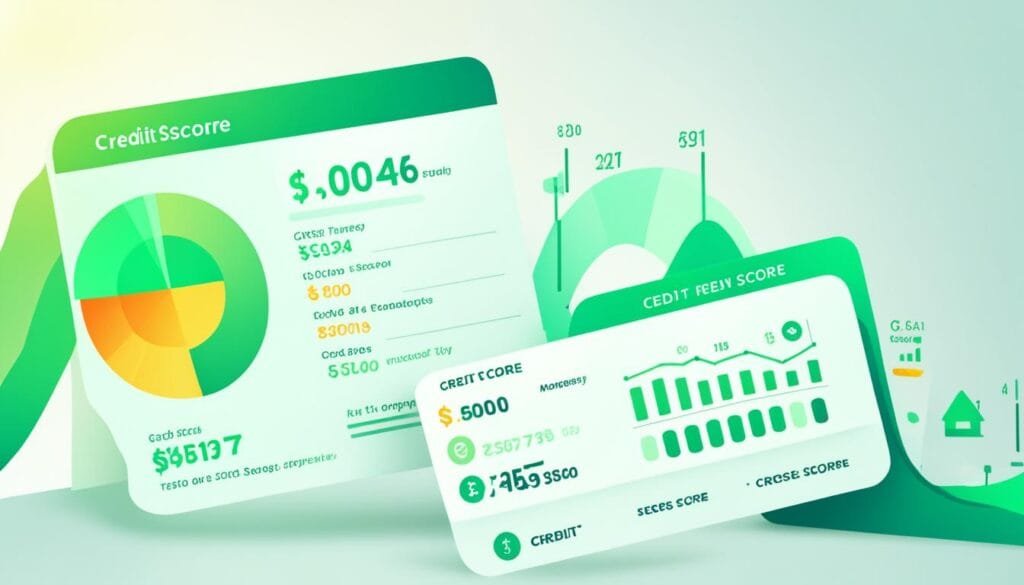Joint credit applications allow two or more individuals to apply for credit together, sharing ownership of the loan and responsibility for repayment. This type of application is commonly used for mortgages, auto loans, and personal loans. Joint applications can increase the chances of approval, especially if one applicant has a better credit score or income. It’s important to compare lenders, check eligibility requirements, and gather necessary documentation before applying for a joint loan.
Key Takeaways:
- Joint credit applications involve two or more individuals applying for credit together.
- Joint applications are commonly used for mortgages, auto loans, and personal loans.
- Applying for a joint loan can increase the chances of approval.
- It’s important to compare lenders, check eligibility requirements, and gather necessary documentation before applying for a joint loan.
- Consider the pros and cons of joint loans before making a decision.
Understanding Joint Loans vs Co-signed Loans
When considering applying for a loan with multiple individuals, it’s essential to understand the differences between joint loans and co-signed loans. Both types of credit arrangements involve more than one borrower, but they have distinct characteristics and implications.
Joint Loans
A joint loan is a credit agreement where both applicants are listed on the loan agreement and share ownership of the loan. This means that both borrowers have equal responsibility for loan repayment. Joint loans can be used for various purposes, such as mortgages, auto loans, or personal loans.
Joint loans provide the advantage of combining the financial strengths of multiple borrowers, increasing the chances of loan approval. If one applicant has a higher credit score or income, it can positively impact the loan terms and interest rate for both borrowers.
Co-signed Loans
On the other hand, a co-signed loan involves one person lending their good credit to help another person qualify for a loan. The co-signer does not have ownership rights to the loan but is responsible for loan repayment if the borrower defaults. Co-signed loans are commonly used when one borrower has limited credit history or a low credit score.
By adding a co-signer, the primary borrower may increase their chances of loan approval and obtain more favorable terms. Additionally, co-signed loans can help the primary borrower establish or improve their credit history.
It’s important to consider the implications of joint loans and co-signed loans before making a decision. Here’s a comparison table highlighting the main differences:
| Joint Loans | Co-signed Loans |
|---|---|
| Both applicants share ownership of the loan | Co-signer does not have ownership rights to the loan |
| Both applicants are equally responsible for loan repayment | Co-signer is responsible for repayment if the borrower defaults |
| Can increase chances of loan approval and better loan terms | Helps primary borrower qualify for a loan or improve credit history |
| Loan ownership may complicate asset distribution in case of separation or divorce | Co-signer’s credit may be affected by the borrower’s payment behavior |
Understanding the differences between joint loans and co-signed loans is crucial when evaluating the best option for your specific financial situation. Consider factors like loan ownership, responsibility for repayment, and potential impact on credit history. Always consult with a financial advisor or lender to make an informed decision before applying for any type of loan.
How to Get a Joint Loan
To get a joint loan, both applicants need to meet the eligibility requirements set by the lender. This includes credit score and debt-to-income ratio criteria. It’s important to pre-qualify with multiple lenders to compare offers and determine the best terms.
When applying for a joint loan, it’s essential to gather all the necessary documentation to support the loan application. This may include proof of income, bank statements, and identification documents.
Research and compare online lenders, banks, and credit unions to find the best options for joint loans. Each lending institution may have different eligibility criteria and interest rates, so it’s crucial to evaluate multiple options before making a decision.
Joint Loan Eligibility
Before applying for a joint loan, it’s important to understand the eligibility requirements set by lenders. The following factors may be considered:
- Credit scores of both applicants
- Debt-to-income ratio of both applicants
- Stable employment history
- Proof of income for both applicants
Meeting these eligibility criteria will increase the chances of getting approved for a joint loan. However, it’s essential to note that some lenders may have stricter requirements than others.
Joint Loan Application Process
The joint loan application process typically involves the following steps:
- Pre-qualification: Fill out a pre-qualification form with basic information to determine your eligibility and get an estimate of loan terms.
- Compare lenders: Research and compare lenders to find the best options for joint loans. Consider interest rates, loan terms, fees, and customer reviews.
- Complete the application: Fill out the joint loan application form with personal and financial information for both applicants. Be prepared to provide supporting documentation.
- Credit check: Lenders will perform a hard credit check on both applicants to assess their creditworthiness. This check will temporarily impact credit scores.
- Loan approval: After reviewing the application and conducting a credit check, the lender will decide whether to approve or deny the joint loan application.
- Loan disbursement: If approved, the lender will disburse the loan funds, and both applicants will be responsible for the repayment.
It’s important to note that the joint loan application process may vary depending on the lender and the type of loan.
| Online Lenders | Banks | Credit Unions |
|---|---|---|
| Convenient online application process | Established institutions with a range of loan options | Lower interest rates and personalized service |
| Faster approval and funding | Strong customer support and relationship management | Membership requirements may apply |
| Competitive interest rates | Accessibility through physical branches | Community-focused with local support |

By following the joint loan application process and conducting thorough research, borrowers can find the best lenders and secure favorable terms for their joint loan.
How Joint Loans Affect Credit Scores
Joint loans have the potential to impact credit scores both positively and negatively. Understanding how credit scores are affected is crucial for both applicants. Let’s explore the key factors that influence credit scores in the context of joint loans.
On-Time Payments
One of the most significant factors in maintaining good credit scores is making on-time payments. When both applicants consistently make payments on the joint loan, it can improve their credit scores over time. However, it’s important to note that this positive impact is contingent upon the lender reporting the payments to the credit bureaus.
Missed Payments
Conversely, missed payments have the potential to negatively impact both applicants’ credit scores. If either applicant fails to make payments on time, it can result in late payment records on their credit reports. These late payments can lower their credit scores and make future credit applications more challenging.
To mitigate this risk, it is imperative for both parties to stay on top of loan repayment. Establishing a system to ensure timely payments are made can help maintain favorable credit scores. Regular communication, setting reminders, and automated payments can be effective strategies for managing joint loan repayments.
The Influence of Credit Bureaus
Credit bureaus play a crucial role in determining credit scores. They collect and maintain credit information about individuals from various lenders and financial institutions. It’s essential to note that joint loans, like all other credit accounts, are reported to credit bureaus. These reports include the accounts’ payment history and credit utilization, which are factors that significantly impact credit scores.
Both negative and positive information about joint loan payments will be reflected in the credit reports of both applicants. Therefore, consistent on-time payments are crucial for both applicants to maintain favorable credit scores.
Managing Credit History
Joint loans can also impact the credit history of both applicants. As the loan is jointly owned, it becomes part of the credit history for both individuals. This means that a joint loan will be included in each applicant’s credit history, showcasing their shared responsibility in repaying the loan.
| Effects of Joint Loans on Credit Scores | Positive Impact | Negative Impact |
|---|---|---|
| On-Time Payments | Improves credit scores | No impact |
| Missed Payments | No impact | Low credit scores |
| Credit Bureaus | Reports on-time payments | Reports missed payments |
| Credit History | Shared responsibility in loan repayment | Shared responsibility in missed payments |
Table: Effects of Joint Loans on Credit Scores
It’s crucial for all applicants to be responsible and stay proactive in managing their credit history. This includes staying informed about their credit reports, addressing any discrepancies promptly, and maintaining a healthy credit utilization ratio.
Overall, joint loans have the potential to impact credit scores positively through on-time payments reported to credit bureaus. However, missed payments can have adverse effects on credit scores for both applicants. It’s essential for both parties to maintain open communication and responsible loan management to ensure a positive credit score impact.

Pros and Cons of Joint Loans
Joint loans can offer both advantages and disadvantages to borrowers. It’s essential to consider these pros and cons carefully before deciding to apply for a joint loan.
Pros of Joint Loans
- Increased Chance of Qualifying: Applying for a loan jointly can enhance the chances of approval, especially if one of the applicants has a higher credit score or income.
- Share Repayment Costs: Joint loans allow borrowers to divide the loan repayment responsibilities between multiple individuals, making it easier to manage the financial burden.
- Potential Financial Strain: By sharing the loan burden, individuals can avoid dealing with the entire loan amount and associated financial strain on their own.
Cons of Joint Loans
- Damaged Relationship: Taking on a joint loan can put strain on relationships, especially if one borrower is unable to fulfill their repayment obligations. The financial implications can lead to disputes and strained relationships.
- Responsibility for Entire Loan: If one co-borrower fails to make payments, the other borrower(s) could be held responsible for the entire loan amount. This puts additional financial burden and potential credit damage on the responsible borrower(s).
It’s important to carefully weigh the advantages and disadvantages of joint loans before making a decision. Open communication, trust, and a thorough understanding of each individual’s financial situation are crucial to ensure a smooth borrowing experience. By evaluating personal circumstances and considering the potential risks, borrowers can make an informed choice.
| Pros of Joint Loans | Cons of Joint Loans |
|---|---|
| Increased chances of qualifying for a loan | Being responsible for the entire loan if the co-borrower fails to pay |
| Ability to share the cost of repayment | Risk of damaging relationships if one person is unable to fulfill repayment obligations |
| Potential for a higher loan amount or lower interest rate |
Is a Joint Loan Right for You?
A joint loan may be the right choice in certain situations. If an individual cannot qualify for a loan on their own due to low income or credit score, adding a co-borrower with better qualifications can increase the chances of approval. Joint loans also come with several benefits that make them attractive to borrowers.
Qualifying for Joint Loans
One of the major advantages of joint loans is the ability to qualify for larger loan amounts and lower interest rates. Lenders consider both applicants’ income and credit scores when determining loan eligibility. If one applicant has a higher income or better credit score, it can offset any deficiencies in the other applicant’s qualifications, making it easier to meet the lender’s criteria.
Benefits of Joint Loans
There are several benefits to consider when evaluating whether a joint loan suits your needs:
- Increased chances of approval: A joint loan can help you qualify for the credit you need when you might not be eligible on your own.
- Lower interest rates: With better credit scores or higher income combined, you have a stronger bargaining position with lenders, potentially securing lower interest rates.
- Access to larger loan amounts: Joint loans can provide access to more substantial loan amounts, allowing you to pursue bigger financial goals.
When to Consider Joint Loans
It’s important to consider joint loans in situations where it makes financial sense:
- When you require additional financing for a purchase or project that you wouldn’t be able to afford individually.
- When you want to take advantage of lower interest rates and potentially save money over the life of the loan.
- When both applicants are mutually committed to the loan’s repayment and can comfortably afford the monthly payments.
Loan Affordability
Before deciding on a joint loan, carefully evaluate your financial situation to ensure loan affordability. Consider factors such as:
- Your combined debt-to-income ratio to determine if you can comfortably afford the additional monthly payment.
- The stability of your joint financial circumstances, ensuring both applicants have a stable income and employment.
- Your long-term financial goals and whether taking on a joint loan aligns with those objectives.
By asking these critical questions and performing a comprehensive financial analysis, you can confidently decide if a joint loan is the right choice for you.
| Pros of Joint Loans | Cons of Joint Loans |
|---|---|
| Increased chances of qualifying for a loan | Potential financial strain if one applicant fails to meet their repayment obligations |
| Lower interest rates | Risk of damaging the relationship if financial difficulties arise |
| Access to larger loan amounts | Shared responsibility for the entire loan if the co-applicant defaults |
Can Joint Credit Applications Impact My Marriage and Credit?
When applying for joint credit, both partners’ credit histories come into play. This can impact your marriage and credit essentials. If one partner has a poor credit score, it may affect the couple’s ability to secure favorable terms. Discussing financial habits and goals is crucial for a healthy financial future.
Conclusion
Joint credit applications can be a valuable option for individuals seeking to secure credit together. By understanding the differences between joint loans and co-signed loans, following the necessary steps to obtain a joint loan, considering the impact on credit scores, and carefully evaluating the pros and cons, individuals can make an informed decision about whether a joint loan is the right choice for their financial needs.
When considering a joint loan, it’s crucial to assess personal financial situations and consult with a financial advisor if necessary. Being aware of the responsibilities and potential risks associated with joint loans can help individuals avoid financial strain and potential damage to their relationship with the co-borrower.
In summary, joint credit applications offer the opportunity to increase the chances of loan approval and share the cost of repayment. However, it is important to thoroughly understand the implications and responsibilities involved in joint loans before proceeding. Using joint loans as a tool for achieving financial goals requires careful consideration and informed decision-making.
FAQ
What is a joint credit application?
A joint credit application allows two or more individuals to apply for credit together, sharing ownership of the loan and responsibility for repayment.
What is the difference between a joint loan and a co-signed loan?
With a joint loan, both applicants are listed on the loan agreement and share ownership of the loan. In a co-signed loan, one person lends their good credit to help another person qualify for a loan.
How do I get a joint loan?
To get a joint loan, both applicants need to meet the eligibility requirements set by the lender. This includes credit score and debt-to-income ratio criteria. The joint loan application process involves submitting personal and financial information, as well as supporting documentation.
How do joint loans affect credit scores?
Joint loans can have both positive and negative effects on credit scores. On-time payments can help improve credit if the lender reports to credit bureaus. However, missed payments by either applicant can have a negative impact on both credit scores.
What are the pros and cons of joint loans?
The pros of joint loans include an increased chance of qualifying for a loan, sharing the cost of repayment, and potentially obtaining a higher loan amount or lower interest rate. However, cons include being responsible for the entire loan if the co-borrower fails to pay and the risk of damaging the relationship if one person can’t fulfill their repayment obligations.
Is a joint loan right for me?
A joint loan may be the right choice if you cannot qualify for a loan on your own and adding a co-borrower can increase your chances of approval. However, it’s important to evaluate your own financial situation and determine if you can afford the loan payments before applying.

